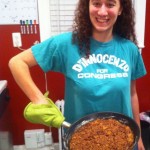Ben Kuhn has a great post up on strategies for inviting (and retaining) new kinds of people to a group that you run. Ben is writing specifically about effective altruism, an interest of mine, too, but I think his thoughts generalize pretty well.
Hands down, this was my favorite thing that he said:
Get interested in other people’s experiences. Don’t try to convince them to “become an EAer;” try to get them to convince you of something. Figure out how their perspective can add to effective altruism, not what effective altruism should subtract from them.
This is great advice, and I’m going to try to make sure I keep this in mind when meeting people, recommending books, and inviting them to events. It’s pretty easy to fall into a Procrustean mindset, trying to make people into a slightly blurred, generic exemplar of your group. It’s harder to address folks as individuals and to wind up longing for something from them instead of just wishing something for him.
It’s pretty easy to fall into this error in Christian circles, where it’s easy to wind up thinking about becoming Christlike only by pruning away sins, rather than by living life more abundantly, and getting the chance to be loved and delighted by your fellow parishoners.
There are two remarks by C.S. Lewis and G.K. Chesterton I love that fit in very well with Ben’s point. And, since I quoted them both in my book (in the context of how the Eucharist strengthens us), I’ll just put the excerpt here:
Each of the saints is united wholly to God: in him they move and live and have their being (Acts 17:28). And yet, communion with God is not a great annihilation. We are not dissolved into God, so diluted by his infinite nature as to be erased. Somehow, our unique souls are preserved.
It is feasting on the Eucharist allows us to be transmuted, rather than blurred out. C. S. Lewis writes in Mere Christianity about this kind of [ungeneric] growth in God: “There are no real personalities apart from God. Until you have given up your self to Him, you will not have a real self. Sameness is to be found most among the most ‘natural’ men, not among those who surrender to Christ. How monotonously alike all the great tyrants and conquerors have been, how gloriously different are the saints.”
G. K. Chesterton picks up the theme in Orthodoxy: “It is true that the historic Church has at once emphasized celibacy and emphasized the family; has at once (if one may put it so) been fiercely for having children and fiercely for not having children. It has kept them side by side like two strong colors, red and white, like the red and white on the shield of St. George. It has always had a healthy hatred of pink.”
Somehow, the mixing of man and Christ makes everyone sharper and more distinct, instead of yielding some averaged-out blandness. The saints have been perfected and healed while still remaining recognizably themselves.
I’d be curious if you guys have any good strategies for keeping this idea at the front of your minds during conversations, events, or other parts of everyday life.
Are there questions you like to ask that often help you notice how other people can add to effective altruism (or your project of interest)? Are there contexts in which you find it easier to glimpse the “glorious difference” among potential saints?
If you’re in DC, you’re invited to my book launch party tomorrow at the Catholic Information Center!

















